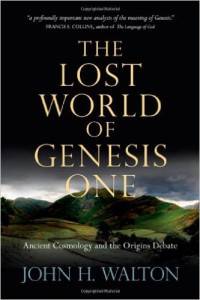 There’s been a lot of buzz surrounding John Walton’s The Lost World of Genesis One and his The Lost World of Adam and Eve. I have finished the former and have begun the latter and would like to offer a few comments at this point.
There’s been a lot of buzz surrounding John Walton’s The Lost World of Genesis One and his The Lost World of Adam and Eve. I have finished the former and have begun the latter and would like to offer a few comments at this point.
Walton’s thesis is basically that Genesis 1, like other ancient creation accounts, is concerned with function as opposed to material origins and should be read accordingly. That is, it is describing how God created the world to work and His control over the world more than the question of how He made something out of nothing. To be sure, Walton agrees that God did created everything. He is simply arguing that Genesis 1 is not concerned with that particular issue. His argument is that when ancient people talked about creation they were talking about it in terms of function and were not concerned with the kinds of questions we are concerned with in empirical science. However, Walton argues, we have imposed our modern concerns on the text and read it as discussing material creation. In so doing, we are eisegeting modern categories into the text. The result is we are threatened by scientific theories that would appear to conflict with our modernistic reading when, in fact, they are no threat at all since Genesis 1 is really not discussing those questions anyway.
Allow me to reflect a bit more on what I think I hear him saying. I hear Walton saying (unless I am hearing him wrongly) that Genesis 1 cannot be concerned with creatio ex nihilo as it has been classically defined because it doesn’t actually posit nihilo. That is, “the deep” exists before the first day. I gather that “the deep” could almost be seen (in Walton’s proposal) as pre-functional creation, the shadowy realm of cosmic chaos and whatever processes were taking place at that time. Thus, according to Walton, something like evolution could actually be true (he doesn’t say it is or isn’t, though he seems to have sympathies with some aspects of biological evolution so far as it does not lapse into teleology).
Walton argues that Genesis 1 is about function: how God sovereignly designed and created the world to operate, to work. It isn’t discussing how it came to be as much as it is discussing what God made it to be. He then works through Genesis 1 showing what that looks like.
Furthermore, Genesis 1 is employing temple language, language that would have been readily apparent to many ancient cultures. Thus, when God “rests,” He takes His place as Lord of the creation that He designed to function with specificity and purpose and harmony. That is, the whole world is a temple.
Well. Heady stuff indeed.
Anyway, what Walton has in his favor is his strong emphasis on the hermeneutical principle of “authorial intent,” his critique of the modern penchant for eisegeting our categories onto an ancient worldview, his helpful point that science is always in flux and that every age has a scientific worldview in which any communication necessarily takes place and which, necessarily, informs this communication, his correct premise that the “literal” reading of the text is, by definition, the reading that most accurately harmonizes with what the author was trying to do.
What concerns me is the novelty of the proposal, for starters. Walton does not deny this. Tellingly, he cannot muster a single example from two millennia of exegesis that says what he is saying. His response is that we have now discovered ancient texts from ancient cultures that allow us to reconstruct to some extent the ancient context regarding creation accounts and can therefore now better understand the language and ideational content of words employed in Genesis 1. I have no doubt that that the gist of that argument is true. Understanding any historical context should sharpen our hermeneutics. But (and I realize this is a rather simplistic argument), would not the most ancient Jewish exegetes have picked up, preserved, and passed on at least some vestiges of these concepts were they as self-evident to the ancients as Walton suggests?
I am not trying to suggest that Walton’s proposal is wrong simply because it can point to no earlier reflection of its claims. I am simply saying that there is good reason to be extremely cautious about such proposals. The burden is on Walton at this point, though he has certainly offered an intriguing proposal.
Furthermore, I have questions about whether or not the witness of the rest of scripture as it pertains to creation really does verify this “function” as opposed to “material creation” hypothesis. If Walton is correct, certainly we should be able to read the other references to creation in this light and sense that our hermeneutic flows more naturally with the removal of our imposed and foreign constructs. But does scripture harmonize with this view? That is a larger question that will require some specific and detailed work.
This is my first exposure to this line of thinking, so my comments are going to be cursory. But this is very interesting stuff and I thank my friend Pastor Kevin Griggs for recommending Walton’s work. (Not, I should add, that Griggs necessarily agrees with Walton either. He, like me, is simply trying to process and think about this.)
